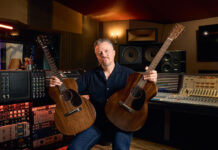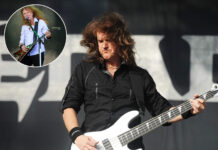
Why the crisis in grassroots venues and small festivals will impact guitar bands
It probably wouldn’t shock you to learn that most of the world’s biggest artists got their start on the ladder playing small venues and small-scale events. While the music industry might have shifted somewhat in recent years to enable solo artists to build their careers without needing to gig, for bands, and especially heavier bands, that live education remains essential.
READ MORE: Lizzy McAlpine on finding power as a rhythm guitarist and learning to fall in love with live performance
The conversation around how to protect and maintain grassroots venues is not a new one, but it’s arguably never been more pressing and important than it is right now. Over the years, the industry has fought to find solutions, and in the UK the government is being pressed to intervene to preserve these vital spaces. While the issue is industry-wide, heavier scenes are suffering even more because of the lack of smaller venues and festival showcases that can champion these alternative acts.
Working hard to correct this, this May, Focus Wales returned for its 14th year running with a line-up of over 250 artists. Spotlighting talent across all genres from around the world, the festival took over Wrexham for another year of championing some of the best new acts the music industry has to offer.
For the first time since its opening in 2010, the festival showcase opened its doors to more metal and punk slots, with rising bands such as Fat Dog, Groom the Giant and GR/EF provided as festival highlights – but for these smaller guitar bands, the festival is an important lifeline.
Focus Wales 2024. Image: Kev Curtis Photography
In Sharp Focus
Playing their debut Focus Wales set to a packed-out crowd at Hope Street Church, is Liverpudlian feminist-punk punk quartet, Piss Kitti.
“It’s really nice to play something like this,” bassist and backing vocalist Clara Cicely tells us. “Especially as a punk band, because we tend to get left out of this conversation because we don’t sound like the other artists. We wouldn’t have been able to play the bigger shows if we hadn’t played the smaller venues first. We started off playing in basements and back rooms in dusty pubs.”
Small venues and festival showcases like Focus Wales are essential for the next generation of metal, punk and post-rock bands because they provide a gateway to further opportunities.
Additionally, seeing these bands live is, for many of the acts, an essential component to understanding their musical identity. Some bands’ concepts transcend better on stage than on record, especially those within the heavier scenes, since their performances are more likely to be an art form of industrial sounds and avant-garde visuals.
The Pleasures at Focus Wales 2024. Image: Robin Parker
Experimental post-rock band Butch Kassidy is a prime example of this. In the Penny Black venue, they put on a spellbinding performance of climatic drum solos, soaring guitars and mumbled spoken-word.
While they’ve started to make a name for themselves in the post-rock world, with one EP on Spotify and a sound that certainly isn’t likely to cross over to the mainstream any time soon, their opportunities to court new fans and labels is limited. If festival showcases such as Focus Wales and grassroots venues didn’t exist, it would be next to impossible to discover bands alike, who have a limited digital footprint.
“The arts in the UK provides so much money into the economy, but they don’t reinvest – it’s unbelievable,” says Butch Kassidy vocalist and guitarist Fionn. “Metal and heavy music is humongous. Heavy music is always viewed as a risk, but it’s got such a huge market, globally as well,”
Despite the significant amount of funding seemingly available for the arts in the UK from governments and other sources, often that cash struggles to reach bands at the heavier end of the spectrum who don’t have the obvious commercial and mainstream potential.
“There needs to be investment and support for people trying to make music,” says Fionn. Without sufficient funding, there’s a very limited amount the public can do to ensure that smaller bands in these scenes can survive.”
Dyatlov at Focus Wales 2024. Image: Steve White
Global Concerns
Struggling to find exposure and label interest is clearly not something that’s limited to UK bands either. Playing two sets across the festival weekend, Spanish electro-punk project Dyatlov brought their innovative, noisy post-punk vision to Focus Wales through disturbed synths and ominous lyrics. It was also a chance for them to put themselves in the shop window.
“It was motivating that they listen to our music outside of the Canary Islands,” Dylatov tells us about their experience playing at Focus Wales. But they share many of the same issues that other heavy bands do with finding venues and festivals to plan.
“Help new bands find a record label,” they plead. “Demand that festivals have a minimum of emerging bands, instead of bombarding people with the same music in the major media, thereby poorly educating the entire society culturally. Worry more about art more than money.”
CVC at Focus Wales 2024. Image: Alexandra Durrant
Focus on The Future
Festival showcases enable artists to showcase their music to a much broader audience than a few hundred people who might come to a show. Without these spaces, there is a severe lack of equal opportunity for the artists to develop and grow into the next generation of punk and metal bands.
It’s something that the organisers of Focus Wales are clearly aware of – at one of the talks taking place at the festival, Music Venue Trusts’ campaigns and communication spokesperson, Toni Coe-Brooker, gave an insight into the current ecosystem of grassroots venues, and how grave the threat to the future of music this represents.
“Rising costs have led to the closure of numerous venues, jeopardising the very essence of what makes our industry vibrant and diverse”, she says. “You would’ve all heard last year that 125 grassroots music venues closed. This crisis can not be ignored anymore, for it only endangers the livelihood of emerging artists. It also undermines the rich tapestry that has been built over the last 70 years.”
As a way to combat the challenges emerging artists face in the music industry, this year MVT will launch their brand-new forthcoming campaign titled ‘The Artist Pledge’ – a scheme based around championing emerging artists.
Slate at Focus Wales 2024. Image: Brent Jones
The conversation around the crisis with small venues has often focused on how losing these venues deprives us of the next Ed Sheeran or the next Oasis, but while undeniably true, talking about venues in these terms shows how marginalised heavy bands already are by the wider industry.
As an already niche genre, every small venue played and every festival or showcase an act can play is another previous chance to find a few new fans, to find new opportunities, to make the increasingly unworkable maths of being in a band a little more workable for another week, another month, another year.
Losing grassroots venues would not only vaporise this ecosystem, but also crunch the DIY authenticity and underground roots ingrained within heavy music underfoot – it would be a disaster..
Thankfully, organisations like the MVT and MMF will continue to fight to keep venues open, and hold the government and music industry accountable for supporting the lifeblood of the industry. Hopefully, in time people will come to see how important these spaces are for everyone, but in the meantime it’ll be up to events like Focus Wales to keep offering opportunities to heavy bands – because every opportunity is now so crucial for bands who don’t fit into the mainstream box.
The post Why the crisis in grassroots venues and small festivals will impact guitar bands appeared first on Guitar.com | All Things Guitar.
Source: www.guitar-bass.net











